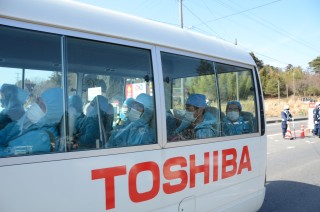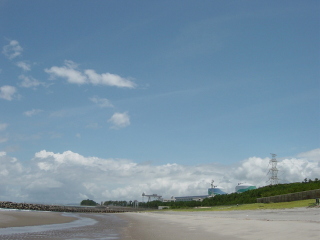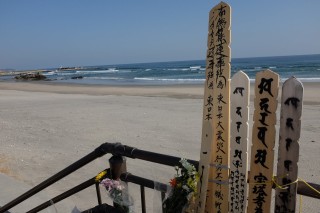
From Ukraine peace plans to Kazakh uranium—all that and more in our new nuclear digest
Our November Nuclear Digest by Bellona’s Environmental Transparency Center is out now. Here’s a quick taste of just three nuclear issues arising in U...
News

Publish date: September 10, 2014
News
Japanese media said Wednesday the country’s nuclear watchdog has green-lighted the restart of two reactors – the first step to reopening an industry that has been idle since the Fukushima disaster – but citizens living near the plant must first give their approval, which is far from guaranteed.
The Nuclear Regulation Authority (NRA) – the watchdog group reconstituted after Japan’s previous regulator’s crony system with industry so egregiously bungled events leading up to Fukushima – said Kyushu Electric Power Co’s Sendai plant in southwestern Japan had met safety requirements to restart, as the country nears the end of its first full year without nuclear power since 1966.
All of Japan’s nuclear power plants have been shut down since March 2011 since a tsunami and earthquake struck the Fukushima Daiichi plant in Northeastern Japan, killing all primary and back up cooling, and leading to the meltdown of three reactors, triggering the worst nuclear disaster since Chernobyl.
The NRA go-ahead to restart operations at Sendai came with assurances to a still-frightened public from Prime Minister Shinzo Abe that his campaign to reignite nuclear power in Japan would be done with an eye to shutting down the oldest plants on its grid, Japanese media reported.

Politicians still cow-towing to industry
To that end, Abe is urging utilities to consider permanently closing the oldest of the country’s 48 total reactors, which face higher safety hurdles than the rest. Weeding out those that are 40 years old or older could mean the decommissioning of a quarter of Japan’s reactors – if utilities agree.
The rub is that while the NRA has say over whether or not a reactor can restart, it doesn’t have the power to order the decommissioning of nuclear power plant – nor does any other government agency – which could lead to a cohort of shut down plants, whose spent nuclear fuel no one wants to take responsibility for.
So Abe, is working in concert with the Ministry of Economy, Trade and Industry (METI) – which oversees electric utilities – to say pretty please to the plant owners.
That the Japanese prime minster, the country’s nuclear watchdog, and the ministry that oversees nuclear power have to go hat in hand to utilities and ask the to shut down and clean up their oldest and most dangerous reactors is a sing of the enormous sway the nuclear industry still holds in Japan even after one of the worst disasters in modern history.
Procedures surrounding Sendai restart
The go-ahead from the NRA to restart two reactors at the Sendai plant comes after it issued a 400-plus-page safety report in July and follows a month-long public consultation period.
But any restart is unlikely before the end of 2014 as the operator, Kyushu Electric Power, is also required to get two more NRA approvals for other facilities at the site.

Widespread anti-nuclear sentiment has bubbled over in Japan ever since the earthquake and tsunami in March 2011 caused meltdowns three reactors at the Fukushima Daichii plant in Northeastern Japan, and triggered the worst nuclear2 disaster since Chernobyl.
Bellona’s managing director and nuclear physicist, Nils Bøhmer, who with other Bellona staff has visited Fukushima, says the Fukushima disaster is ongoing and decades from safely being brought to heel.
He also is dubious that local communities are going to be supportive of restart efforts.
“I doubt they are going get local support, but that could change if the government adds some economic incentives for local governments hosting reactors,” said Bøhmer.
The economic incentives may turn out to be a post-Fukushima bonanza for communities living next door to nuclear power plants. Many of these communities traditionally enjoyed grants from utilities and are dependent on the nuclear stations for employment and hence are more sympathetic to the industry cause.
As such, residents close to Sendai are likely to face choices between safety from future nuclear disasters and immediate glitzy payouts from fat-cat bank accounts of industry, which is willing to finance the pre-Fukushima status quo.
“Let’s hope local communities have a fair and open discussion on the issue of restarting the Sendai reactors,” said Bøhmer.
Can new METI chief garner restart approval?
The unenviable task of trying to convince residents of Kagoshima prefecture, where Sendai is located, will be the cross of Japan’s new METI minister, Yuko Obuchi, to bear, Japanese media reported.

“If people say they are worried, I think it is only natural. If you are a mother, I think it is a kind of feeling that everyone has,” Obuchi was quoted as saying soon after her appointment as Japan’s first female METI head. “The central government must offer a full explanation to these sentiments.”
Obuchi has highlighted the importance of earning the “understanding of hosting communities” who are averse to the prospect of nuclear reactors chugging along down the road from their homes despite the NRA’s stringent new six-month-long safety and stress test regimen.
Obuchi has reportedly dispatched five central government officials to help local bodies in Kagoshima draw up evacuation plans in case of an accident, The Guardian reported.
Reuters also quoted Obuchi as saying she “would like to proceed with smooth decommissioning (of some plants) and at the same time the restart of nuclear power stations certified as safe.”
The new rules under the NRA say that reactors are supposed to be decommissioned when they have reached their 40-year engineered lifespan. They are able to receive 20-year operational extensions, though these are subject to more stringent and more expensive safety regulations.
Arnie Gundersen, a veteran American nuclear engineer told Reuters that dangling the sugar of shuttering the oldest reactors is “clearly part of the strategy by the government and utilities to send a signal to the people of Japan that they are listening and taking into account the lessons of Fukushima.”
Gunderson, who turned away from nuclear power over his assessment that it is essentially unsafe, added that “the suggestion of decommissioning also reflects the challenge faced by utilities in finding the funds to bring older reactors to a standard that can pass NRA approval.”

Our November Nuclear Digest by Bellona’s Environmental Transparency Center is out now. Here’s a quick taste of just three nuclear issues arising in U...

For three years now, Bellona has continued its work in exile from Vilnius, sustaining and expanding its analysis despite war, repression, and the collapse of international cooperation with Russia in the environmental and nuclear fields

The Board of the Bellona Foundation has appointed former Minister of Climate and the Environment Sveinung Rotevatn as Managing Director of Bellona No...

Økokrim, Norway’s authority for investigating and prosecuting economic and environmental crime, has imposed a record fine on Equinor following a comp...